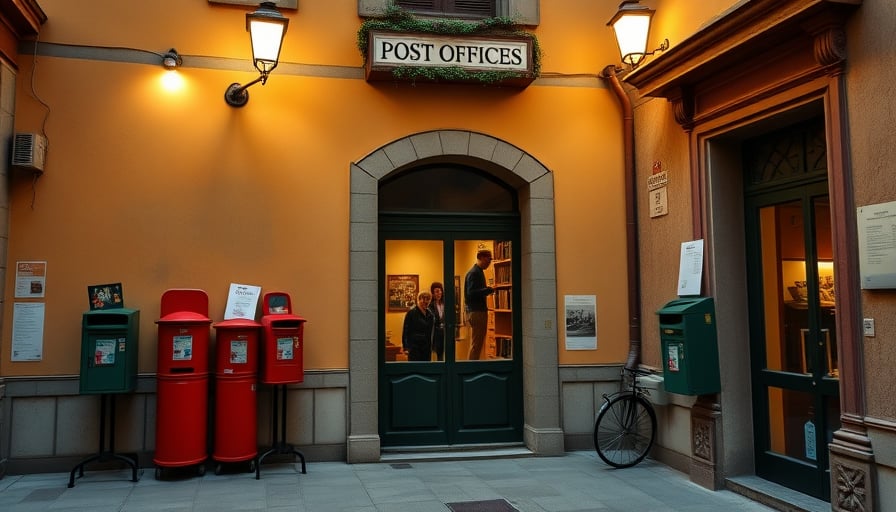Poste Italiane SpA: Sustainability Crown, Operational Strains, and Rising Scrutiny
Poste Italiane SpA, a diversified financial services group listed on the Borsa Italiana Electronic Share Market, has recently attracted headlines for both commendable achievements and unsettling operational issues. The company’s market capitalisation stands at €27.32 billion, trading at €20.71 per share on 5 November 2025, with a 52‑week low of €12.80 and a high of €21.09. Its price‑earnings ratio of 12.571 indicates a modest valuation relative to peers in the financial and insurance sectors.
1. Global Sustainability Accolade – A Double‑Edged Badge
In a statement released on 7 November 2025, S&P Global’s Corporate Sustainability Assessment (CSA) placed Poste Italiane at the apex of European insurers and second globally for sustainability performance. This accolade, credited to the leadership of CEO Matteo Del Fante and Director‑General Giuseppe Lasco, reflects the firm’s aggressive push towards sustainable practices across its three core segments: insurance, financial services, and mail‑and‑parcel logistics.
While the award signals a robust commitment to ESG metrics, it also raises expectations for tangible outcomes. Investors will scrutinise whether the sustainability premium translates into measurable risk mitigation, cost reductions, and revenue growth. The company’s current P/E of 12.571 suggests that the market has yet to fully price in the long‑term benefits of its ESG initiatives, leaving a potential gap for opportunistic investors.
2. Operational Disruptions: From Stornara to Maddaloni
Poste Italiane’s domestic footprint is under strain, as evidenced by multiple local reports:
Stornara – The “Bankless” Village: A vivid account from Corriere Foggia describes an elderly pensioner, Maria, waiting outdoors for a closed office, highlighting the persistent lack of digital infrastructure in rural areas. The incident underscores a broader systemic issue: the company’s legacy postal network is ill‑prepared for the digital transition demanded by a post‑pandemic world.
Maddaloni – Employee‑Linked Fraud: Il Mattino reports that a former employee was implicated in a €360,000 account‑theft scheme affecting multiple clients between February and December 2024. The investigation, involving Carabinieri and the local prosecutor’s office, casts a shadow over internal controls and governance, potentially eroding customer confidence.
These operational disruptions erode Poste Italiane’s brand equity, especially at a time when the company’s sustainability rating could otherwise bolster investor sentiment.
3. Digital Identity and Customer Convenience
The firm’s involvement in the Italian public digital identity system (SPID) continues to evolve. BusinessOnline.it notes that while SPID remains free for users until 2030, service providers have begun to charge annual fees for maintaining active SPID accounts. This shift signals a potential monetisation strategy for Poste Italiane, but also introduces a friction point for customers accustomed to free, seamless access.
4. Strategic Partnerships and Market Positioning
While not directly linked to Poste Italiane, the concurrent moves by Intesa Sanpaolo and BlackRock to expand digital banking across Belgium and Luxembourg, reported by Il Mattino, hint at a competitive landscape where traditional postal‑bank hybrids must innovate rapidly. Poste Italiane’s positioning as a hybrid insurer and logistics operator could either be leveraged for cross‑selling services or become obsolete if it fails to keep pace with fintech incumbents.
5. Financial Performance Context
The company’s latest share price of €20.71 sits comfortably below its 52‑week high but above the low, suggesting resilience amid volatility. However, the absence of a recent earnings release in the supplied data leaves a gap in assessing profitability trends. The P/E ratio of 12.571 remains moderate; if the sustainability rating does not translate into earnings growth, the ratio could compress further, potentially signalling undervaluation or risk.
6. Conclusion – A Company at a Crossroads
Poste Italiane’s recent sustainability crown could serve as a catalyst for renewed investor interest, but it is insufficient to offset the mounting operational and governance challenges highlighted by local news. The juxtaposition of high ESG ratings with on‑ground failures – from stalled offices to employee fraud – creates a paradox that demands decisive action. Stakeholders will watch closely to see whether Poste Italiane can translate its ESG leadership into concrete operational excellence and financial performance that justifies its €27 billion market cap.
